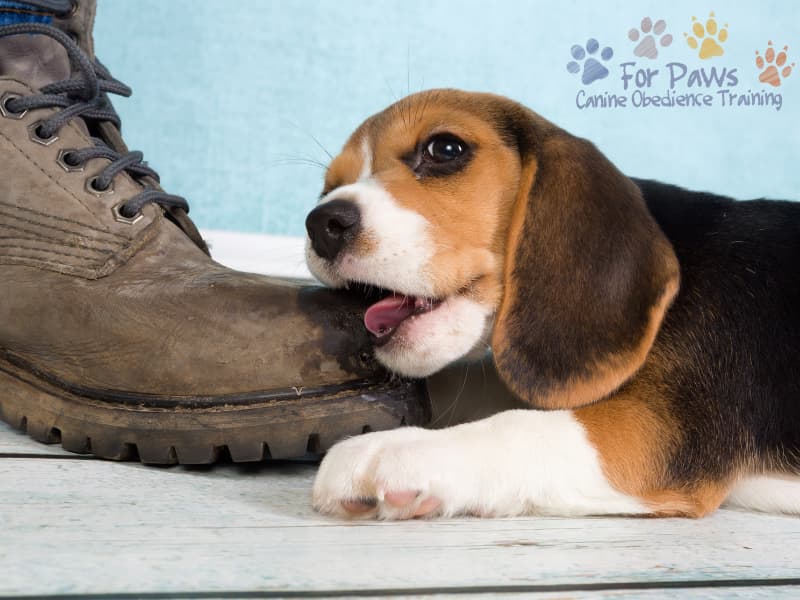Dealing with a Teething Puppy
Puppy teething is a natural yet challenging phase for both you and your furry friend. Just like babies, puppies experience discomfort as their teeth grow in, and they often resort to chewing on anything they can find to ease their pain. At For Paws Dog Training, we understand how overwhelming this stage can be, which is why we’re here to help pet owners across Northern Kentucky navigate the teething process while keeping their puppies happy and healthy.
If you’re looking for expert guidance, our Group Classes and Private Consultations are great ways to address behavioral issues like destructive chewing. Let’s dive into practical tips for managing a teething puppy!
Understanding Puppy Teething
Dealing with a Teething Puppy Puppy teething typically begins around three weeks of age and continues until about six months. During this time, your puppy will go through two major stages:
- Milk Teeth Eruption (3-6 weeks): Puppies develop their baby teeth, also known as milk teeth.
- Adult Teeth Replacement (3-6 months): Baby teeth fall out, and adult teeth grow in. This phase is often the most uncomfortable, as it involves tender gums and increased chewing behavior.
To get a detailed overview of this process, check out this puppy teething guide from the AKC.
Signs Your Puppy is Teething
Dealing with a Teething Puppy Here are a few common teething symptoms to watch for:
- Excessive chewing on furniture, shoes, or random objects.
- Drooling more than usual.
- Swollen or bleeding gums.
- Whining or irritability.
- Loss of baby teeth (you may find them around your home).
If your puppy is displaying these behaviors, don’t worry—it’s a normal part of development. However, it’s important to address chewing issues early to avoid destructive habits. At For Paws, we can help you manage this behavior through Behavior Modification Sessions.
Tips for Dealing with a Teething Puppy
1. Provide Appropriate Chew Toys
Invest in durable, safe chew toys designed specifically for teething puppies. Chewing helps soothe sore gums and redirects destructive behavior. Look for toys like:
Rotating toys can keep your puppy engaged and prevent boredom.
2. Freeze Chew Toys or Treats
Cold toys or treats can help numb your puppy’s sore gums. Try freezing a damp washcloth or offering frozen carrots or dog-safe fruit. For more ideas, check out this guide to frozen dog treats.
3. Puppy-Proof Your Home
Prevent access to items your puppy might chew, such as shoes, electrical cords, or furniture. Use baby gates or crates to control their environment. Visit our Pet Care Services page for tips on safe puppy-proofing.
4. Implement Positive Reinforcement Training
Teach your puppy what’s acceptable to chew through positive reinforcement. Reward them with treats or praise when they choose their toys over inappropriate items. At For Paws, we specialize in positive reward-based training techniques that work with your puppy’s natural instincts.
5. Use Puppy Teething Gels
Teething gels specifically designed for dogs can provide temporary relief from gum pain. Always check with your vet before using any products. For more information on teething gels, visit PetMD.
6. Schedule Regular Playtime
Engaging your puppy in playtime helps burn off excess energy and reduces the urge to chew. Check out our Training Schedule to see how our group classes can incorporate play and learning.
7. Monitor Your Puppy’s Diet
Ensure your puppy is getting the right nutrition to support healthy teeth and gums. Consult with your vet or explore this puppy feeding guide.
When to Seek Professional Help
Dealing with a Teething Puppy If your puppy’s chewing becomes extreme or they show signs of pain that don’t improve, consider reaching out to a professional trainer or veterinarian. At For Paws, our Private On-Site Training sessions are tailored to address your puppy’s unique needs.
Additionally, if you’re considering advanced training for your growing puppy, our programs include Puppy Culture and AKC Canine Good Citizen Certification.
Common Mistakes to Avoid
- Punishing Your Puppy for Chewing
Never punish your puppy for chewing—it’s a natural behavior during teething. Instead, redirect them to appropriate toys. Learn more about managing unwanted behaviors on our Dog Training Videos page. - Ignoring the Problem
Teething-related chewing won’t go away on its own. Without redirection, your puppy may develop lasting destructive habits. - Using Unsafe Chew Items
Avoid giving your puppy bones, rawhide, or hard objects that can damage their teeth. For more information on safe chew options, visit ASPCA.
How For Paws Can Help
Dealing with a Teething Puppy At For Paws Canine Training, we offer a variety of programs to support you and your puppy during the teething phase. Our Residency Programs combine expert training with a comfortable home environment, ensuring your puppy learns in a stress-free setting.
We also provide Daily Visits and Pet Sitting to give you peace of mind when you’re away, knowing your puppy is in good hands.
External Resources for Puppy Teething
Dealing with a Teething Puppy For additional tips and resources, check out these helpful links:
- American Kennel Club – Puppy Teething
- Rover – Frozen Dog Treat Recipes
- PetMD – Puppy Teething Tips
- Nylabone Puppy Products
- KONG Puppy Toys
- ASPCA – Chewing Behavior
- Dogtime – Teething Relief
- Outward Hound Puppy Toys
- Petco – Puppy Teething Solutions
- Chewy – Puppy Chew Toys
- Vetstreet – Puppy Behavior
- Fetch by WebMD
- Puppy Training Solutions
- Therapy Dog Training
- Leash Training Basics
- Dog-Friendly Home Tips
- Service Dog Certification
- Positive Dog Training
- Teething Products
- Healthy Puppy Treats
Dealing with a Teething Puppy
Teething is a tough but temporary phase in your puppy’s life. By following these tips and using the resources at For Paws Dog Training, you can help your puppy navigate this stage while building healthy habits. If you’re located in Northern Kentucky, contact us at (859) 802-6076 or visit our Contact Us Page to schedule a consultation.
Let’s work together to give your puppy the best start in life!

